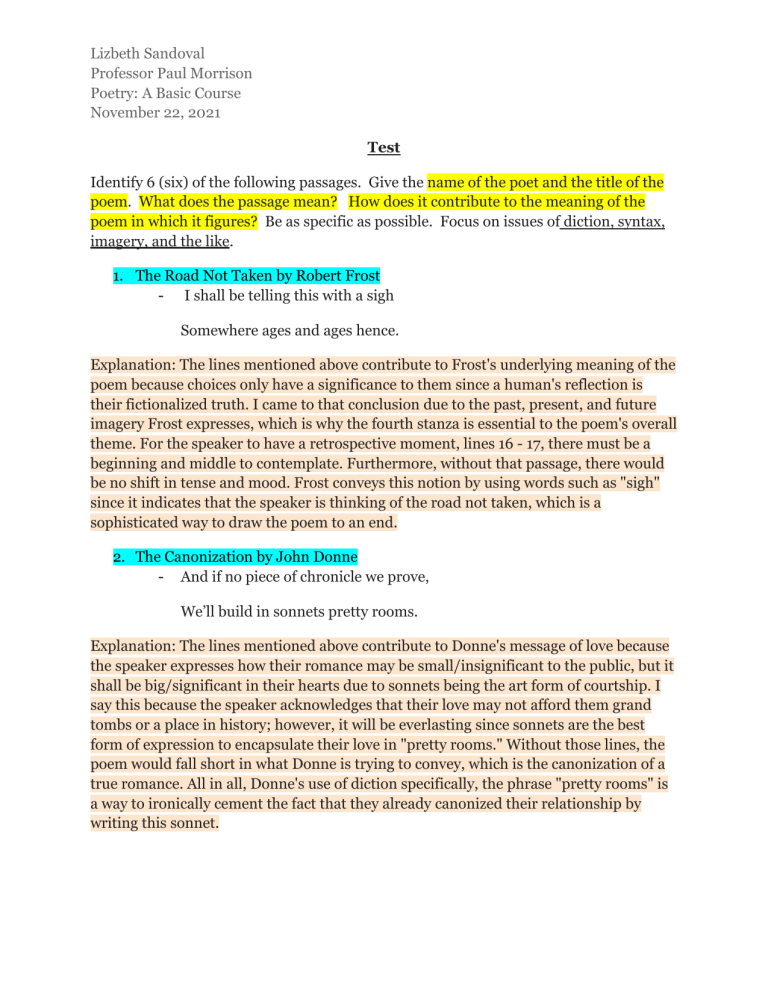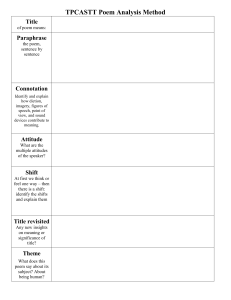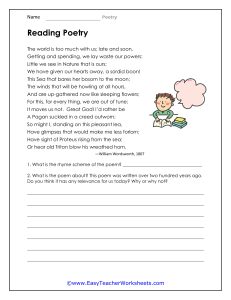
Lizbeth Sandoval Professor Paul Morrison Poetry: A Basic Course November 22, 2021 Test Identify 6 (six) of the following passages. Give the name of the poet and the title of the poem. What does the passage mean? How does it contribute to the meaning of the poem in which it figures? Be as specific as possible. Focus on issues of diction, syntax, imagery, and the like. 1. The Road Not Taken by Robert Frost - I shall be telling this with a sigh Somewhere ages and ages hence. Explanation: The lines mentioned above contribute to Frost's underlying meaning of the poem because choices only have a significance to them since a human's reflection is their fictionalized truth. I came to that conclusion due to the past, present, and future imagery Frost expresses, which is why the fourth stanza is essential to the poem's overall theme. For the speaker to have a retrospective moment, lines 16 - 17, there must be a beginning and middle to contemplate. Furthermore, without that passage, there would be no shift in tense and mood. Frost conveys this notion by using words such as "sigh" since it indicates that the speaker is thinking of the road not taken, which is a sophisticated way to draw the poem to an end. 2. The Canonization by John Donne - And if no piece of chronicle we prove, We’ll build in sonnets pretty rooms. Explanation: The lines mentioned above contribute to Donne's message of love because the speaker expresses how their romance may be small/insignificant to the public, but it shall be big/significant in their hearts due to sonnets being the art form of courtship. I say this because the speaker acknowledges that their love may not afford them grand tombs or a place in history; however, it will be everlasting since sonnets are the best form of expression to encapsulate their love in "pretty rooms." Without those lines, the poem would fall short in what Donne is trying to convey, which is the canonization of a true romance. All in all, Donne's use of diction specifically, the phrase "pretty rooms" is a way to ironically cement the fact that they already canonized their relationship by writing this sonnet. Lizbeth Sandoval Professor Paul Morrison Poetry: A Basic Course November 22, 2021 3. My Last Duchess by Robert Browning - Notice Neptune, though, Taming a sea-horse, thought a rarity, Which Claus of Innsbruck cast in bronze for me! Explanation: The lines mentioned above contribute to Browning's description of a self-absorbed Duke who shares the insights of his last marriage to a servant of a Count, the daughter of whom the Duke is attempting to win over. In the preceding passage, Browning utilizes the bronzed Neptune scene to expose the Duke's arrogant behavior once more; although, there is much more of that in the poem. The poetic element that Browning uses in lines 54 - 56 is imagery because it portrays a Duke in a power that equates his dominance to the Roman god of the sea. In a way, even the syntax of "Taming a sea-horse, thought a rarity," has a deliberate pause between "sea-horse" and "thought" because it mimics Neptune's strength to break a "sea-horse" which is similar to what the Duke is trying to with the in-laws. 4. Ars Poetica by Archibald Macleish - A poem should be equal to: Not true. Explanation:The lines mentioned above contribute to Macleish's overall theme of how authentic poetry should just be. It is simply the artistic expression of human existence, and that alone is enough to make it "true." In the preceding passage, it is evident that the syntax of the quoted excerpt is almost like a mathematical equation, where Macleish does not want poetry to be the God-given answer to some philosophical question but merely a staple for "not true" expressions. Overall, those two lines, 17 - 18, mark all of the intersections Macleish expands on from moon metaphors to ones about maple leaves. Lizbeth Sandoval Professor Paul Morrison Poetry: A Basic Course November 22, 2021 5. Leda and the Swan by William Butler Yeats - A sudden blow …. Explanation: The line mentioned above contributes to Yeats' way of alluding to events that are going to "blow" in the near future. For instance, at the beginning of the poem, Leda is being raped by Zeus in his swan form, which leads to her impregnation. It is later revealed that their child is Helen, who will cause the death of Greek king Agamemnon, and it is these events that are the true "sudden blow." It is evident that the diction of "blow" is significant to the poem because one moment, such as Leda's rape, can have a butterfly effect on various situations. 6. Sonnet 130 by William Shakespeare - I think my love as rare As any she belied with false compare. Explanation: The line mentioned above contributes to Shakespeare's astute observation of how the speaker's lover is like any other woman that poets tend to describe with rose-colored lies. However, the big difference between Shakespeare and those poets who falsely compare their muses is his doted approach. Evidently, the final couplet, lines 1314, reaffirm this notion by the critical and honest tone the speaker takes. It is with the diction of "rare" and "false compare" that these words enhance the speaker's romantic partner. Lizbeth Sandoval Professor Paul Morrison Poetry: A Basic Course November 22, 2021


